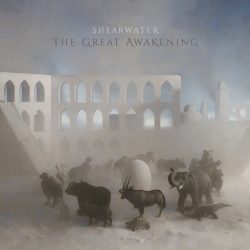A profound meditation of the natural world.
 Album titles can range from the blindingly obvious to totally obscure and sometimes seem to have been created as an afterthought. Not so Shearwater’s ‘The Great Awakening’. As with that sense of disorientation on stirring from deep sleep, a kind of “where am I?” Frontman Jonathan Meiburg’s sonic landscape feels every bit as confusing. As consciousness returns so these songs, melodies and rhythms begin to make sense. Acclimatise further and Meiburg’s perceptive imagery of the natural world assumes a sharp reality. ‘The Great Awakening’ is to a large extent a concept album but is never pretentious. Needless to say, assigning a genre is pointless – a psychedelic 1970s prog/folk is the best this reviewer can come up with. Meiburg’s vocals range from a whisper to a Gregorian chant over arrangements that swing equally widely from gentle acoustic strumming to plangent orchestral flourishes.
Album titles can range from the blindingly obvious to totally obscure and sometimes seem to have been created as an afterthought. Not so Shearwater’s ‘The Great Awakening’. As with that sense of disorientation on stirring from deep sleep, a kind of “where am I?” Frontman Jonathan Meiburg’s sonic landscape feels every bit as confusing. As consciousness returns so these songs, melodies and rhythms begin to make sense. Acclimatise further and Meiburg’s perceptive imagery of the natural world assumes a sharp reality. ‘The Great Awakening’ is to a large extent a concept album but is never pretentious. Needless to say, assigning a genre is pointless – a psychedelic 1970s prog/folk is the best this reviewer can come up with. Meiburg’s vocals range from a whisper to a Gregorian chant over arrangements that swing equally widely from gentle acoustic strumming to plangent orchestral flourishes.
Musically, Meiburg does just about everything; he leads, he writes, sings and is a multi-instrumentalist. Since founding Shearwater in 1999 Meiburg has recorded solo as well as collaborating with several other musicians, one of whom Dan Duszynski played on and produced ‘The Great Awakening’. Meiburg also writes about nature. As part of his geographic and ornithological studies he wrote his thesis about the shearwater, a type of seabird.
Stuck in the pandemic Meiburg combined his studies, writing and music to come up with ‘The Awakening’, a meditation about isolation. It is also about the sparkling South American landscapes that are home to falcons called caracaras, the subject of his book ‘A Most Remarkable Creature: The Hidden Life and Epic Journey of the World’s Smartest Birds of Prey’. These eleven songs are its sonic illustrations.
Opener ‘Highgate’ begins barely audibly. With a languorous stretch Meiburg wakens then, brought round by waves of mighty orchestral crashes, he booms before subsiding almost as suddenly. ‘No Reason’ is more contemplative, a surveying of the scene before the hymnal strains of ‘Xenarthran’ blend into glistening strings. Found in South America, a xenarthran is a mammal related to an armadillo though that is not at all apparent from Meiburg’s lyrics. A choir of howler monkeys bids the song farewell.
Another soundscape is ‘Empty Orchestra’ with equally majestic layers of synthesiser but if these anthemic pieces slightly overwhelm in places, the more subtle quieter tracks convey even more atmosphere. Though testing the ranges musically and vocally ‘Aqaba’ has an intense sense of release. “Then ride/ To the sea/ Then run/ Through the cascades/As the sound/ Falls away”. Vocals from Emily Cross smooth Meiburg’s flowing landscape. Harmonies and the first ever solo by a Guyanese toucan add further colour. ‘There Goes The Sun’ is so atmospheric, truly a musical sunset while ‘Wind Is Love’ signs off the record more delicately still.
‘The Great Awakening’ is in stark contrast to Meiburg’s previous album, ‘Jet Plane & Oxbow’, a record of fear at what was happening to America under Trump. When writing for a new album Meiburg had not lost that sense of hopelessness but as he put it, “I didn’t want to make hopeless music.” Instead, he takes us into another, natural, world where particularly in the tracks with less instrumentation that give space to organic harmonies, ‘The Great Awakening’ most certainly offers hope.


